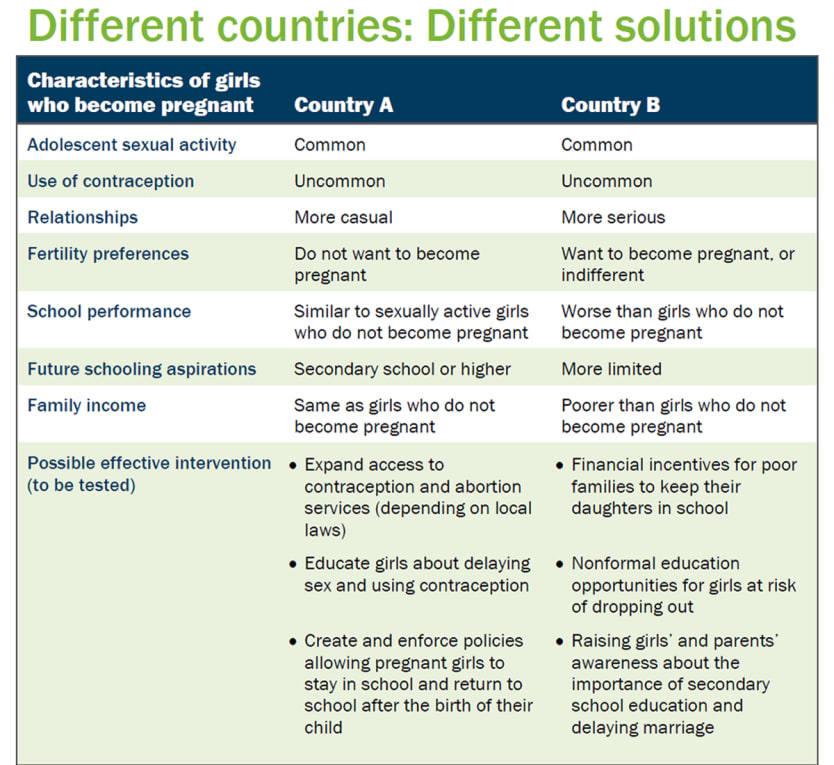
Does pregnancy really cause girls to drop out of school? Globally, “schoolgirl pregnancy” is cited as one of the primary barriers to girls’ education. But the story may not be as simple as it seems.
Yes, an adolescent girl’s formal education is usually over the moment she becomes a mother. Laws and culture often discourage girls from returning to school after giving birth. Unmarried girls may be pressured to marry the father of the child. Married or not, having a child can put an adolescent girl under intense financial strain. Finding work might be the only way to provide for her young family. Going back to school may feel impossible.
So how do we intervene? What can be done to support adolescent girls — to help those who want to prevent pregnancy and stay in school, and to help girls who give birth to continue their education?
Before intervening, it’s important to understand the different possible causes of school dropout. Is pregnancy the only issue? Could there be other factors in a girl’s life that make her both more likely to become pregnant and more likely to leave school prematurely?
Picture two countries: We’ll call them Country A and Country B. In both countries, 25 percent of girls have a pregnancy before they leave school.
In Country A, premarital sex is common and contraceptive use is low among adolescent girls; schoolgirl pregnancies are usually unplanned. In this country, while girls who are sexually active may differ from their peers who are not, girls who do become pregnant are just like their sexually active peers who do not: They perform just as well (or just as poorly) in school, they are just as likely to want to continue on to secondary school, and their parents have similar incomes.
In other words, if these girls had not become mothers, they would have remained in school as long as their peers. The relationship between schoolgirl pregnancy and school dropout in Country A is similar to patterns that Population Council research has identified in parts of Malawi and Kenya.
In Country B, adolescent schoolgirls are having sex, but usually in the context of serious relationships or marriage. Among girls who are performing poorly in school, and come from poorer households, pregnancies may be planned — or at least not actively prevented. Their families may not put a high value on secondary education. They may perceive fewer opportunities awaiting them if they continue in school.
For all of these reasons, girls in Country B may well have dropped out of school prematurely even if they did not become pregnant. The general patterns in Country B are more like what our research has found in parts of Bangladesh.
The bottom line: In Country A, pregnancy “causes” school dropout — because sexually active adolescent girls who get pregnant are similar to peers who do not. In Country B, pregnancy is not causing school dropout. The girls who are getting pregnant are doing worse than their counterparts in other ways too.

The solution to the problem of schoolgirl pregnancy — and to school dropout more broadly — is not one-size-fits-all. The cause — and remedy — will be different in different situations. Investing the time and resources to understand the causes of dropout in each setting will pay off with more effective interventions.
In Country A, effective interventions would expand access to contraception and abortion services (depending on local laws) for adolescent girls, including educating girls about rights and gender norms, delaying sex and using contraception. Creation and enforcement of policies allowing pregnant girls to stay in school and return to school after the birth of their child may also improve girls’ education in these settings.
In Country B, combating school dropout would require interventions such as financial incentives for poor families to keep their daughters in school, informal education opportunities such as tutoring and girls’ groups for those at risk of dropping out, and raising girls’ and parents’ awareness about the benefits of secondary school education and delaying marriage.
First lady Michelle Obama and other luminaries have called recently for bold and creative action to keep girls in school and give them the opportunities they deserve. Championing girls’ education is critical. But what’s necessary for progress is to understand what’s threatening girls’ education so we can take the right measures to address these threats.
Join the Devex community and access more in-depth analysis, breaking news and business advice — and a host of other services — on international development, humanitarian aid and global health.
